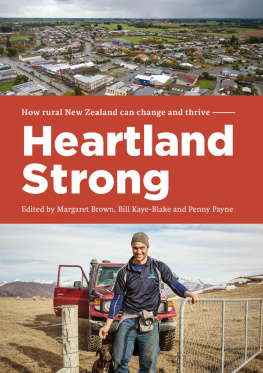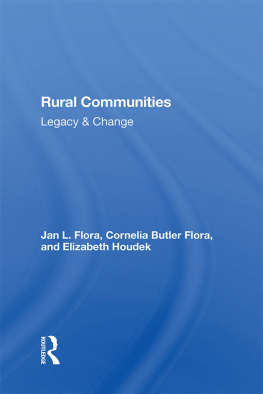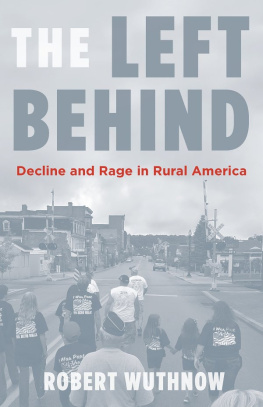Community Welfare Organisations in Rural Myanmar provides an original and timely analysis of Myanmar at the cusp of change, engaging with important themes of precarity, post-agrarian change and citizenship. Through extended ethnography, Michael Griffiths gives a rarely seen, in-depth account of Myanmars political and societal transitions, which readers will find both absorbing and insightful.
Elaine Lynn-Ee Ho, National University of Singapore, author of Citizens in Motion
The waves of change washing across rural Myanmar, positive and negative, are quite easily identified. But local-level societal responses to such changes are frequently missed. In this rich, well-timed and important book, Michael Griffiths explores the role of emergent reciprocal parahita organisations in protecting livelihoods in the context of considerable precarity.
Jonathan Rigg, Chair in Human Geography, University of Bristol, UK
Community Welfare Organisations in Rural Myanmar
This book provides an in-depth study of the moral economies emerging from within conditions of precarity in rural communities in contemporary Myanmar.
James C. Scotts seminal work The Moral Economy of the Peasant argued that peasant notions of subsistence and expectations of reciprocity formed the basis for subsequent rebellion as economic conditions changed and new market forces were introduced. Now, nearly a century on, Michael Griffiths argues that the conditions faced by rural communities in Myanmar remain precarious, but different forms of moral economy shape their responses. In the contemporary context, the moral economy of rural communities is characterized by the emergence of localized, self-organized community welfare associations which adopt a sophisticated iteration of self-help framed by the Buddhist concept of parahita (altruism). This book analyses the performative nature of these welfare organizations as a form of politics, asking how notions of citizenship expressed in these organizations promote more inclusive, or more exclusive, practices towards non-Buddhist minorities.
At a time when discourse on identity in Myanmar has been dominated by practices of othering and exclusion, this book provides an important analysis of what citizenship and reciprocity means in contemporary rural Myanmar. This book is a critical resource for researchers working on rural development and the social sciences in Southeast Asia.
Michael P. Griffiths has been conducting research on rural development and social protection in Myanmar for over 15 years, regularly advising the national government on poverty reduction strategies and social policy. He is currently working as lead researcher for the Yangon-based Social Policy & Poverty Research Group (SPPRG), which has a particular focus on conducting research relevant to emerging government policy. This book is based on his recent PhD thesis, which studied on traditional social protection organizations in Myanmar. Dr. Griffiths teaches multi-disciplinary research methodology at Mandalay University in central Myanmar, and at the University of Yangon, as well as continuing as a Research Associate at the University of Hull.
Routledge Research on Asian Development
Development and Gender Capital in India
Change, Continuity and Conflict in Kerala
Shoba Arun
Bangladeshs Graduation from the Least Developed Countries Group
Pitfalls and Promises
Edited by Debapriya Bhattacharya
Regional Cooperation for Peace and Development
Japan and South Korea in Southeast Asia
Edited by Brendan Howe
Child and Youth Well-being in China
Lijun Chen, Dali L. Yang, Di Zhou, and Qiang Ren
Modern Slavery and Bonded Labour in South Asia
A Human Rights Based Approach
Elena Samonova
Social Development and the Sustainable Development Goals in South Asia
Edited by Nitya Khemka and Suraj Kumar
Community Welfare Organisations in Rural Myanmar
Precarity and Parahita
Michael P. Griffiths
For more information about this series, please visit: www.routledge.com/Routledge-Research-on-Asian-Development/book-series/RRASIADEV
First published 2020
by Routledge
2 Park Square, Milton Park, Abingdon, Oxon OX14 4RN
and by Routledge
52 Vanderbilt Avenue, New York, NY 10017
Routledge is an imprint of the Taylor & Francis Group, an informa business
2020 Michael P. Griffiths
The right of Michael P. Griffiths to be identified as author of this work has been asserted by him in accordance with sections 77 and 78 of the Copyright, Designs and Patents Act 1988.
All rights reserved. No part of this book may be reprinted or reproduced or utilised in any form or by any electronic, mechanical, or other means, now known or hereafter invented, including photocopying and recording, or in any information storage or retrieval system, without permission in writing from the publishers.
Trademark notice: Product or corporate names may be trademarks or registered trademarks, and are used only for identification and explanation without intent to infringe.
British Library Cataloguing-in-Publication Data
A catalogue record for this book is available from the British Library
Library of Congress Cataloging-in-Publication Data
Names: Griffiths, Mike (Conservationist), author.
Title: Community welfare organisations in rural Myanmar /
Michael P. Griffiths.
Description: New York : Routledge, [2019] | Series: Routledge research
on Asian development | Includes bibliographical references and index.
Identifiers: LCCN 2019040049 (print) | LCCN 2019040050 (ebook) |
ISBN 9780367429737 (hardback) | ISBN 9781003000464 (ebook)
Subjects: LCSH: Social service, Rural
Burma. | Rural development Burma. | Economic developmentMoral and ethical aspectsBurma. |
PeasantsBurma. | BurmaRural conditions.
Classification: LCC HN670.7.Z9 G75 2019 (print) | LCC HN670.7.Z9
(ebook) | DDC 306.09591dc23
LC record available at https://lccn.loc.gov/2019040049
LC ebook record available at https://lccn.loc.gov/2019040050
ISBN: 978-0-367-42973-7 (hbk)
ISBN: 978-1-003-00046-4 (ebk)
Typeset in Goudy
by Apex CoVantage, LLC
The idea for this book came from engaging with the work of James C. Scott whilst writing my own PhD thesis, and observing uncanny parallels in the origins and nature of social unrest in rural Myanmar during the time period featured in his seminal work The Moral Economy of the Peasant and the dynamics of rural Myanmar which have been the subject of my own study for the past decade and a half. For many outside of Myanmar, the dominant narratives and images of the country are those of bloody suppression of demonstrations, long-standing border wars displacing thousands of refugees, and violent ethnic conflict in Rakhine State leading to a forced exodus of over half a million people. International media led the charge to vilify de facto leader Daw Aung San Suu Kyi. How could a celebrated icon of human rights and democracy preside over what in many quarters was already being classified as genocide? Perhaps most perplexing was reports of violence encouraged by Buddhist monks, typically viewed as paragons of pacifist virtue. Much of the political analysis of these events has focused on three elements: the legacy, both past and present, of military rule (Steinberg, 2006; Ware & Laoutides, 2019); allied to this, the pervasive dominance of Bamar, and to some extent Buddhist identity in a country home to extraordinary ethnic diversity (Walton, 2013; Walton & Hayward, 2014); and taking a longer view of history, the enduring legacy of colonialism in the establishment of conditions leading to current ethnic and political settlements which remain contested (Cheesman, 2017).





